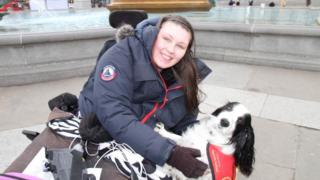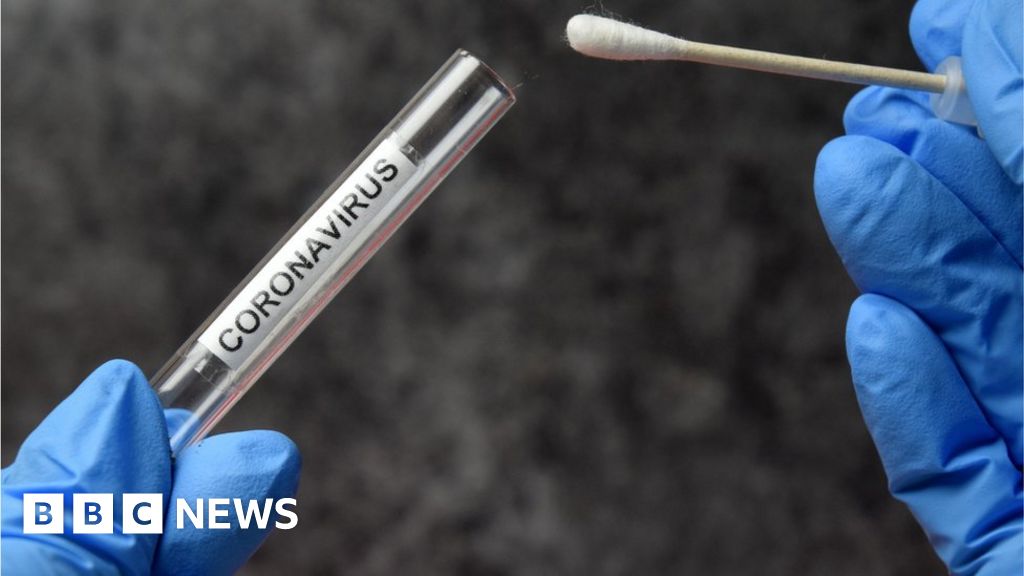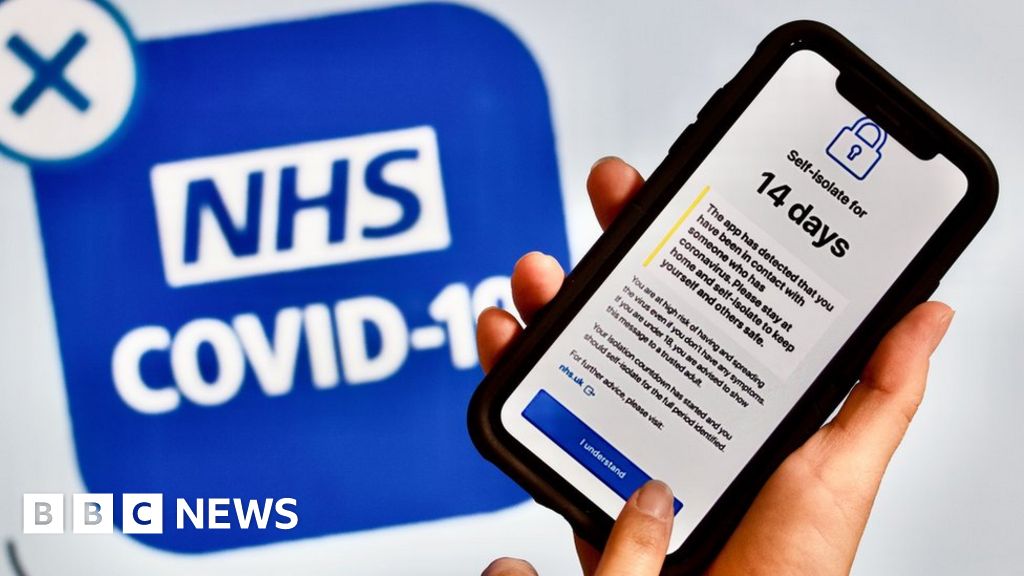 Image copyright
Lucy Watts
Image copyright
Lucy Watts
Lucy Watts MBE is 26 years old and preparing to die if she contracts coronavirus.
The disability advocate has a life-limiting condition which includes multiple organ failure and restrictive lung disease requiring 24-hour care.
As the British Medical Association (BMA) releases guidance preparing doctors to make "brutal" decisions and prioritise treatment for those most likely to recover, Lucy fears that if she contracts Covid-19 she will not be saved.
"My life is devalued on the basis of my disabilities and needs, rather than my life and the difference I have made to the world," she says.
This is an edited version of a blog Lucy wrote over several days, trying to make sense of her personal situation
Image copyright Lucy Watts Image caption Lucy Watts speaking at a TedX event with her support dog Molly at her sideI know full well in this Covid-19 pandemic that my life is not one that will be saved.
This is part-writing therapy, part-rant. It's full of anger and hurt and fear. It's trying to make peace, it's wanting to fight back.
And it's true, every last word.
I will be isolating for a minimum of 12 weeks, possibly longer. I have 24-hour care needs, and am usually cared for by intensive care nurses for 16 hours per day, but my nurses could be recalled to the NHS at any time. My mum can manage the nursing role, but she can't do my care 24/7.
We are practising strict infection control. I have made the difficult step to say that if I get Covid-19, I will not be going to hospital.
I will be considered too frail, too unlikely to survive and too difficult to be weaned off ventilation on the other side - I have respiratory muscle weakness and therefore I'm unlikely to return to a meaningful quality of life - and that's only IF I survived.
This situation is about who has the greatest chance of survival.
I have had to accept this over the last few days. It doesn't sit comfortably with me. I rage and cry that my life is devalued on the basis of my disabilities and needs, rather than my life and the difference I have made to the world.
Image copyright Lucy WattsI'm the 9th most influential disabled person in Britain, I have an MBE for services to young people with disabilities and in 2019 I became a fellow of the Royal Society of Arts for my commitment to disability rights.
I have more than proved my worthiness of being alive, but it counts for nothing in this pandemic.
I've changed hearts and minds through work, passion, determination, skills and experience.
But my life will not be deemed worth saving where cut-throat (metaphorically) decisions have to be made due to limited resources and the large numbers infected with Covid - we're struggling now, and we're not yet near the peak.
Whilst the decision not to go to hospital is mine, the decision about treatment is not within my control.
I have to accept my life is not a priority and will not be saved.
But as much as it makes me livid and distraught, I am a level-headed person who knows this is about saving those who have the highest chance of survival.
My body is on its last legs.
Image copyright Lucy WattsI have so much going on - a nameless syndrome that stops cells making enough energy for my organs and muscles to work. I have multiple organ failure, restrictive lung disease and respiratory muscle weakness, a bowel that is always in and out of obstruction, chronic pancreatitis that keeps flaring up, an immune system that doesn't fight infection well and a new issue causing joint pain and fever 80% of the time.
And yet I have managed to survive sepsis 14 times - is that not a great track record?
Doesn't that show, despite how weak and fragile my body is, I've got a 100% success rate in surviving life-threatening events?
But do I have a high enough chance of surviving this virus - potentially at the expense of someone else's life?
It's a funny head space to be in, feeling like I want to live at all costs, but knowing efforts to prolong my life could cost someone else's.
I've gone through the stages of grief - denial, anger, bargaining, depression - but the "end" of this cycle for me does not end in "acceptance". I do not accept this. I do not accept that my life is less worthy to be saved.
Does it end in understanding? Yes, to an extent, I understand.
I cannot accept I'm not worth saving, but I understand why it has to be this way.
I understand it's not personally levied against me. It's a pandemic in which we have so few resources.
I just want to live. I have so much to do, so many plans, so many ideas.
My life matters, my life is worthy, my life is valuable. But we're in a crisis of innumerable proportions, and people on the frontline have to make heart-breaking decisions. Decisions that aren't fair in any way, but still have to be made.
I say thank you to the NHS, for all everyone is doing. I may make it out the other side of this pandemic; I may not. One thing I can say, however, is that the NHS has kept me alive against the odds for years. It gave me the ability to live an amazing life and to achieve great things and make a difference in the world.
My life matters now and it matters after this. I've created a legacy to be proud of.
Although Lucy is only presuming she will not be treated in hospital and thankfully does not have Covid-19, the BMA's ethical guidance does prepare doctors that they will face "agonising choices" over who gets potentially life-saving treatments, including ventilation.
It says: "It is legal and ethical to prioritise treatment among patients," and urges doctors to consider: "Severity of acute illness; presence and severity of co-morbidity; frailty or, where clinically relevant, age."
The BMA says managers and senior doctors will set "thresholds" for admission to intensive care units - patients whose "probability" of dying, or requiring prolonged intensive support, exceeds the set threshold would not be considered for intensive treatment.
Julian Sheather, an ethical advisor for the BMA, said: "In our present circumstances, the question will no longer be how best to meet individual need, but how to maximise benefits.
"It is preferable to save the lives of three patients with high need and a high likelihood of benefiting than one patient with high need and a low - but nonetheless real - chance of benefiting.
"This is the heart of the moral challenge."
Edited by Beth Rose
For more Disability News, follow BBC Ouch on Twitter and Facebook, and subscribe to the new Cabin Fever Podcast on BBC Sounds.
If you're after more frank disability and mental health chat to get you through the days of Covid-19 sign up to BBC Ouch.
The team have produced two news podcasts - Cabin Fever, discussing a whole lot of corona-related topics and The Isolation Diary charting the highs and lows of one family who are shielding for at least 12 weeks.

 5 years ago
767
5 years ago
767 

